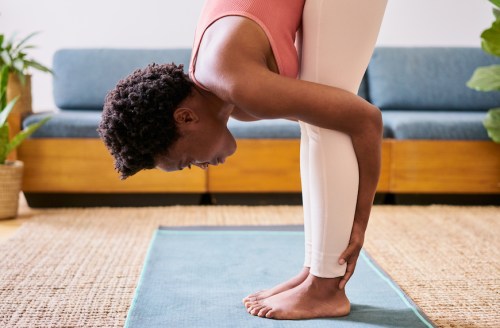Would you call yourself a clutz? Are you constantly tripping over your own feet? While some of us have more coordination than others (and that’s natural), paying extra attention to balance might have brain benefits.
Experts in This Article
Anat Lubetzky, PhD, is an associate professor of physical therapy at New York University
The link between balance and brain health isn’t exactly new. A small 2017 study published in Scientific Reports found balance training can help increase both memory and spatial cognition (a process that involves how the brain organizes and uses information about its environment). The researchers examined 70 people in Germany, all of whom were healthy but weren’t athletes with excellent balance. The research subjects were split into two groups. One group went through a balance training program, and the other group didn’t. Everyone was tested on a set of memory and spatial cognition tasks before and after the training program. As expected, only people in the balance training group significantly improved in the brain health tests.
Studies like this give us a glimpse into what could be important for brain health, but it’s hard to draw long-term conclusions. “Studies are often designed to be able to get some answer in a relatively short time,” Shannon Kilgore, MD, a neurologist based in Palo Alto, California, tells Well+Good. “This study was 12 weeks, which is really not very long.”
However, we do know from other studies that exercise, more generally, is good for our brains. And activities that force us to balance can tap into something called neuroplasticity, which is the ability for neural pathways in our brain to change based on growth and reorganization. Because we have this neuroplasticity, balance training activates the brain, much like acquiring a new language or learning to play the guitar.
“We used to think the brain is like, ‘What you get is what you get,’ and neurons die over time, but you can’t do anything about it,” Anat Lubetzky, PhD, associate professor of physical therapy at New York University, tells Well+Good. Now we know the brain can continue to grow and change even after we’re grown. “Everything we do changes the brain,” Dr. Lubetsky says.
Yet, some balance exercises seem to be better than others for optimizing brain health. “When people think about balance, they think, ‘Am I able to hold this position for a long time?’ And that’s not how people typically fall,” Dr. Lubetzky says. If you think about a time when you fell, it was probably because you didn’t notice something like a step or a crack in the sidewalk. “People fall when the environment changes,” she says. Because of this, balance is much more complex than most of us think.
The Scientific Reports study used what the researchers call a dynamic balance training program. The researchers didn’t simply ask participants to see how long they could stand on one leg. Instead, they had people in the study maintain balance on one leg while being pulled to one side with an elastic strap around their hips, and stand on a wobbling board while passing a medicine ball to a partner, among other exercises. What’s important is that these exercises involve coordination, thinking, planning, and reacting, Dr. Lubetzky says. “A few studies show that more complex exercise improves the brain more, and that’s not surprising,” she explains. More complex situations make our brains work harder.
That said, any exercise is better than none. “I don’t want people to think, ‘If I don’t stand on one leg, throw a ball, and count backward by three, I shouldn’t move because it’s not going to be good enough for my brain,'” Dr. Lubetzky says. The opposite is true. While dynamic balance exercises might boost cognitive function, any exercise is good for your brain—especially cardiovascular exercise. If mobility is an issue, or if you’re looking for gentle exercises, there are lots of balancing exercises that can help. Additionally, according to Harvard Health, bouncing a ball against a wall can help sharpen your coordination, too.
Ultimately, the brain likes blood and oxygen, Dr. Kilgore says. “And so one of the most important things to do to help stave off dementia is to get cardiovascular exercise that improves blood flow to the brain.” The Centers for Disease Control and Prevention (CDC) suggests at least 150 minutes of moderate exercise a week (broken up as you see fit). This would be any exercise that both raises your heartbeat and improves your balance. Dr. Kilgore suggests biking, which requires balance to keep the bike upright and, if you’re biking outside, requires you to react to different terrain or obstacles in your path while also getting your blood flowing.
However, there are many other balance exercises you can try. Both Dr. Kilgore and Dr. Lubetzky recommend dance, which involves balance, coordination, and plenty of cardiovascular movement. But even a simple game like passing a ball with friends in the park can be great for your brain. Throwing a ball around makes you balance yourself as you toss and catch. You have to react. You have to have coordination.
Pilates, yoga (especially vinyasa yoga, which is more dynamic), obstacle courses, even walking on uneven surfaces may benefit your brain over time. The important thing is to challenge yourself.
Oh hi! You look like someone who loves free workouts, discounts for cutting-edge wellness brands, and exclusive Well+Good content. Sign up for Well+, our online community of wellness insiders, and unlock your rewards instantly.
Sign Up for Our Daily Newsletter
Get all the latest in wellness, trends, food, fitness, beauty, and more delivered right to your inbox.
Got it, you've been added to our email list.











